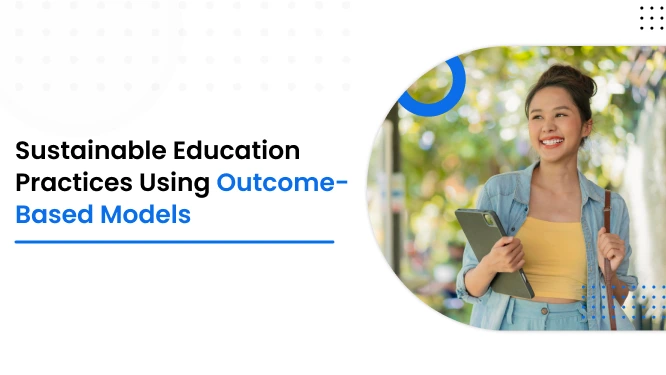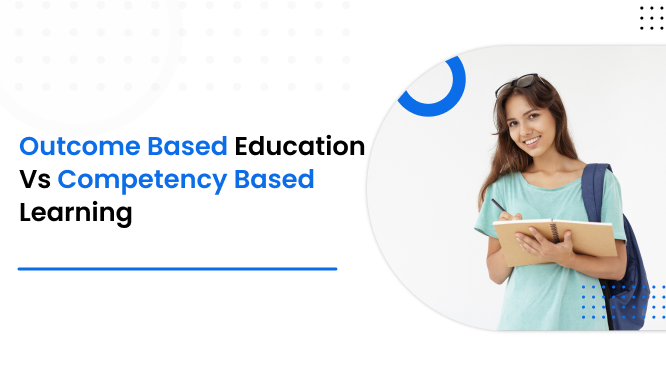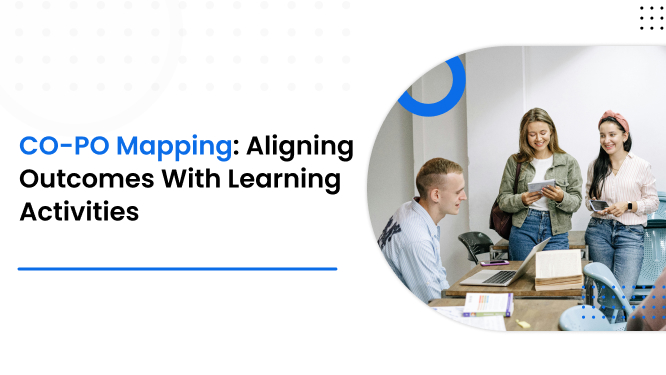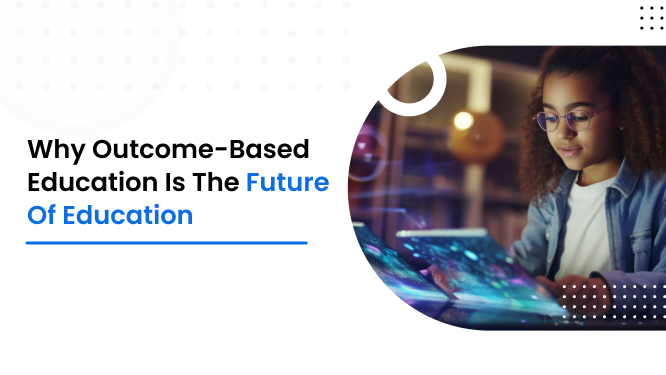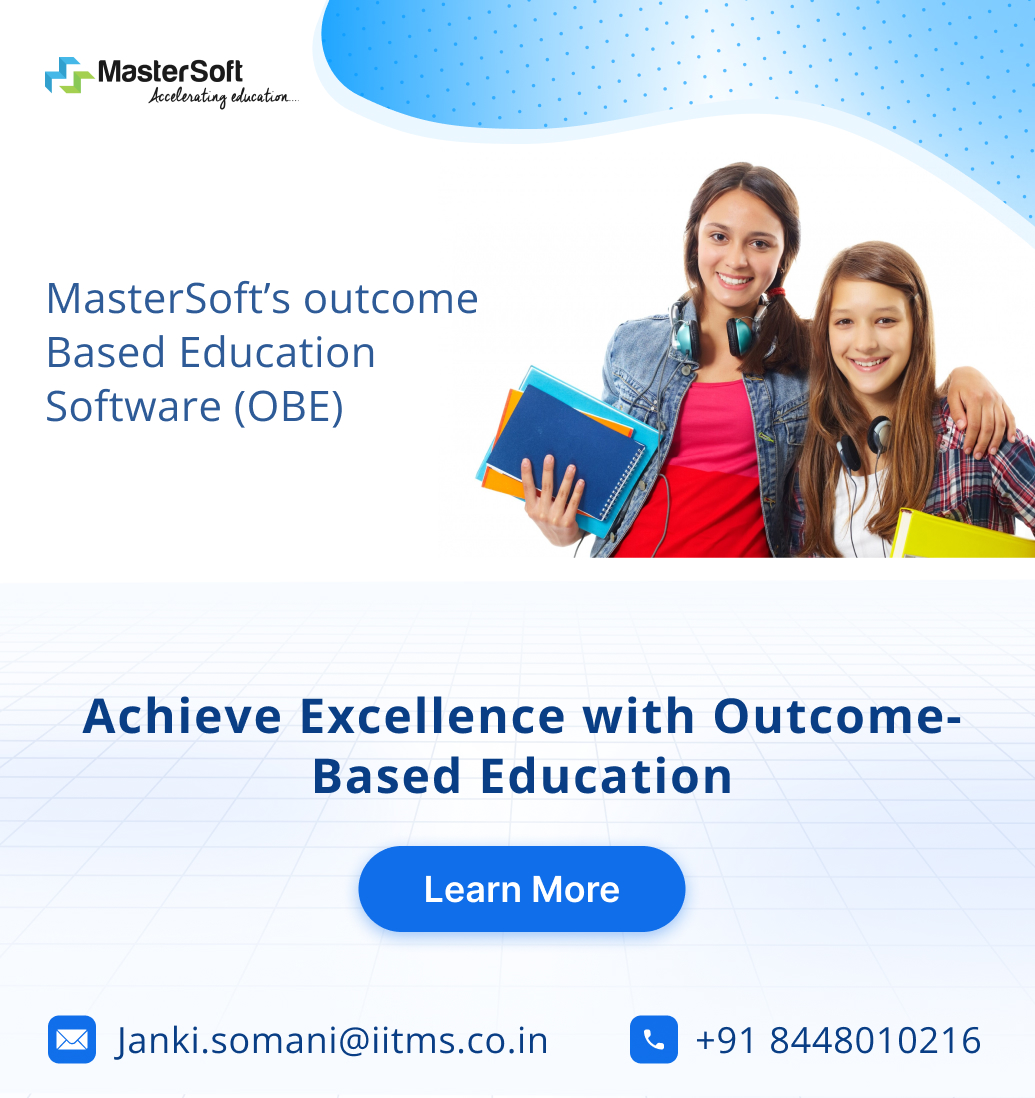Sustainable Education Practices Using Outcome-Based Models
Outcome-based education has emerged as a major contributor to the transformation of the education sector. It offers a structured approach that aligns processes to achieve the desired outcome of student learning.
But exactly, what is Outcome-based education?
Technically speaking, “Outcome-based Education (OBE) is a practice of learning that focuses or centers on the outcome which is to be achieved at the end of a learning program. It goes beyond the traditional learning methods which are based on merely content delivery to the students.”
Outcome-based education (OBE) aims to develop more than theoretical knowledge in students. It aims to nitrite and develop them to acquire knowledge and skills with clarity to apply in the real world.
In this blog, we will understand the concept of Outcome-based education and examine its role in encouraging and promoting sustainable education through smart education practices.
So without any further delay, let’s dive right in
Understanding Outcome-Based Education (OBE)
Outcome-Based Education (OBE) is a student-centered approach that has become more popular recently. Let’s take a closer look at its principles, benefits, and why it is important in today’s educational world.
Key Principles of Outcome-based Education:
- Clear Learning Outcomes: Outcome-based education sets specific goals for what students should achieve by the end of a course or program. These goals are clear, measurable, and align with the overall educational objectives. Instead of just focusing on teaching content, OBE emphasizes what students should be able to do, show, or apply.
- Shift from Input to Output: Traditional education often measures success based on input factors, such as the number of hours spent in class or the amount of content covered. In contrast, OBE measures success by the output—students' skills, knowledge, and abilities. Did they gain the desired knowledge and show mastery?
- Flexibility and Adaptability: Outcome-based education recognizes that students have different backgrounds, learning styles, and abilities. It allows educators to adjust teaching methods to meet individual needs. Whether a student starts with advanced knowledge or faces learning challenges, OBE ensures a personalized learning experience.
- Assessment Aligned with Outcomes: Assessment methods in OBE are directly aligned with the defined outcomes. These assessments measure if students have achieved the desired skills and competencies. Tools like rubrics, performance tasks, portfolios, and project-based assessments are crucial for evaluating student progress.
The Shift to Smart Education
The shift to smart education is transforming how students and educators experience learning. By integrating advanced technologies, classrooms are becoming hubs of innovation and interactive learning.
Let's explore the key components and benefits of smart education:
Integration of Cutting-Edge Technologies:
- Interactive Whiteboards: These modern versions of chalkboards let teachers present dynamic content and engage students in interactive lessons.
- Digital Textbooks: E-books and online resources offer students up-to-date information and a richer learning experience through multimedia content.
- Learning Management Systems (LMS): Platforms like Canvas and Blackboard help manage courses, distribute assignments, and facilitate communication between students and teachers.
Personalized and Flexible Learning:
- Adaptive Learning Software: This software uses algorithms to adjust task difficulty based on each student's performance, providing a tailored learning experience.
- Self-Paced Courses: Online courses allow students to progress at their own pace and fit learning into their schedules.
Global Connectivity and Collaboration:
- Virtual Classrooms: Tools like Zoom and Microsoft Teams let students attend classes remotely, eliminating geographical barriers.
- Collaborative Projects: Students can work with peers around the world, gaining a global perspective and improving cross-cultural communication skills.
Preparing for the Future:
- Digital Literacy: Smart education ensures students become proficient in using technology, an essential skill in today’s workforce.
- Critical Thinking and Problem-Solving: Technology-driven assignments encourage students to think critically and solve complex problems.
Data-Driven Insights:
- Learning Analytics: Educators can track student progress and adjust teaching strategies using data analytics, leading to better learning outcomes.
- Feedback Mechanisms: Educational software provides instant feedback, helping students understand their strengths and areas for improvement.
Implementing OBE in Smart Classrooms with MasterSoft ERP
The integration of MasterSoft ERP solutions in smart classrooms is revolutionizing how institutions implement Outcome-Based Education (OBE).
Enhanced Data Management and Analysis:
- MasterSoft ERP offers a centralized platform for managing student data, crucial for tracking and assessing learning outcomes.
- Its advanced analytics help educators process large amounts of data, providing insights into student performance and learning trends.
Facilitating Outcome-Based Learning:
- The ERP system supports curriculum design and delivery that align with specific learning outcomes, ensuring teaching methods are focused on results.
- It allows for customizing learning paths for individual students, addressing their unique needs and abilities.
Streamlining Administrative Processes:
- By automating routine administrative tasks, MasterSoft ERP frees up staff to focus on strategic, outcome-related activities.
- It simplifies managing academic records, scheduling, and resource allocation, enhancing overall efficiency.
Improving Communication and Collaboration:
- Integrated communication tools within the ERP enable seamless interaction among students, faculty, and administrators.
- The platform promotes collaborative learning environments where students can work together on projects and assignments, fostering teamwork and peer learning.
Supporting Strategic Decision-Making:
- Real-time data from MasterSoft ERP helps make informed decisions that align with the institution's educational goals.
- The system's reporting features allow for continuous monitoring and evaluation of educational strategies, leading to data-driven improvements.
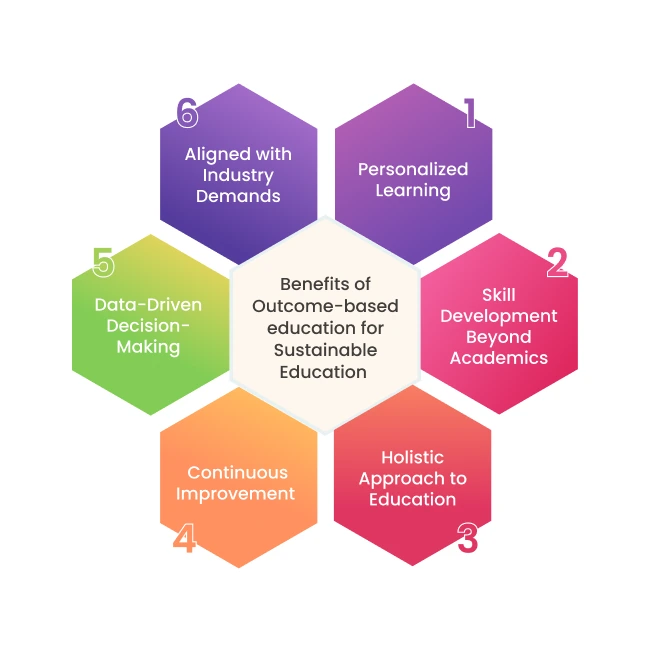
Benefits of Outcome-Based Education for Sustainable Education
Outcome-Based Education (OBE) provides numerous benefits that enhance the sustainability and effectiveness of the educational system. Here are the key advantages and how OBE meets the evolving needs of students and society:
1. Personalized Learning – Recognizing Individual Needs:
- Outcome-based education understands that each student learns differently. By focusing on personalized learning outcomes, OBE ensures that all students can achieve their educational goals.
- Personalization helps reduce dropout rates and increases student engagement, as learners feel more connected to their education.
2. Skill Development Beyond Academics – Cultivating Essential Skills:
- Problem-Solving: Students learn to analyze situations, identify challenges, and find effective solutions.
- Critical Thinking: OBE encourages students to evaluate information, make informed decisions, and think independently.
- Collaboration: Teamwork and communication are emphasized, preparing students to work well with diverse groups.
3. Holistic Approach to Education – Fostering Well-Rounded Individuals:
- Outcome-based education focuses on both academic knowledge and personal development, including character, ethics, and social responsibility.
- Graduates are prepared for their careers and active citizenship, ready to contribute to their communities.
4. Continuous Improvement and Data-Driven Decision-Making – Adapting to Student Needs:
- Outcome-based education encourages continuous improvement. Educators collect data on student performance, assess outcomes, and adjust teaching methods as needed.
- This approach ensures that educational practices stay relevant and effective, adapting to student needs and job market demands.
5. Alignment with Industry Demands – Enhancing Employability:
- Outcome-based education ensures that graduates have the practical skills and competencies employers need.
- Students are more employable because they can apply their knowledge in real-world situations.
6. Long-Term Impact on Society – Making a Positive Difference:
- OBE graduates use their skills and knowledge to address global challenges.
- Whether tackling environmental issues, promoting social justice, or advancing technology, OBE prepares students to make a meaningful impact.
Case in Point: Finland's OBE Success Story
Finland is known for its excellent education system and has successfully adopted Outcome-based education principles. Here’s how it aligns with sustainable education practices:
Student-Centric Approach:
- Finland’s Outcome-based education prioritizes student well-being and holistic development. Students have control over their learning paths, fostering motivation.
Teacher Empowerment:
- Finnish teachers can design learning experiences that align with OBE outcomes, focusing on critical thinking, creativity, and collaboration.
Minimal Standardized Testing:
- Finland reduces standardized testing, emphasizing formative assessment and qualitative feedback. This reduces stress and promotes a love of learning.
Equity and Inclusion:
- Outcome-based education ensures all students, regardless of background, receive equal opportunities. Finland’s commitment to equity supports its sustainable education system.
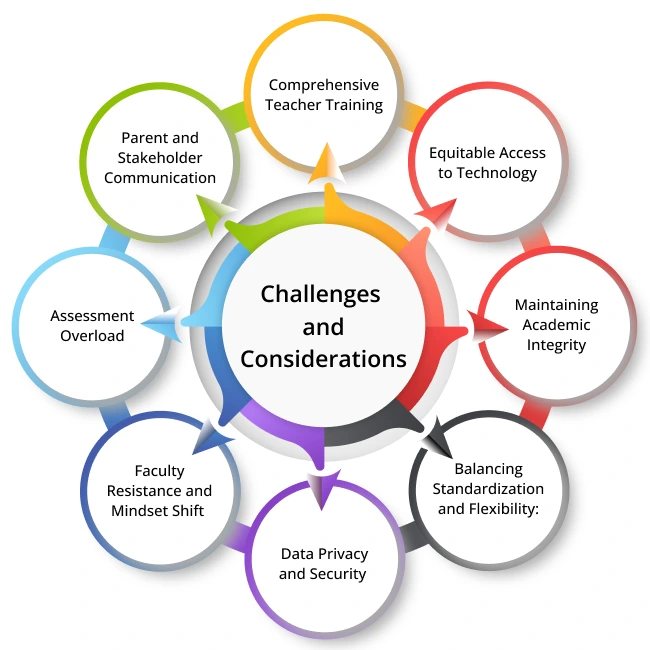
Challenges and Considerations
Outcome-Based Education (OBE) offers immense potential for enhancing education, yet several challenges must be addressed for its successful integration:
Comprehensive Teacher Training
- Challenge: Educators require thorough training in Outcome-Based Education principles, assessment techniques, and technology integration to effectively implement this approach.
- Solution: Establish robust professional development programs aimed at equipping teachers with the necessary skills and knowledge.
- Importance: Well-trained teachers are pivotal in translating Outcome-Based Education theory into practice, ensuring that learning outcomes are achieved.
Equitable Access to Technology
- Challenge: Disparities in access to technology persist across various demographics, hindering equal participation in OBE.
- Solution: Efforts should focus on bridging the digital divide by providing affordable devices, reliable internet connectivity, and comprehensive digital literacy training.
- Importance: Without addressing this gap, marginalized students may miss out on the benefits of Outcome-Based Education, exacerbating existing inequalities.
Maintaining Academic Integrity
- Challenge: The shift to online assessments raises concerns about academic dishonesty, including cheating and plagiarism.
- Solution: Implement stringent measures such as anti-plagiarism tools, design authentic assessments that require critical thinking, and educate students on the importance of academic integrity.
- Importance: Upholding academic honesty is crucial to ensuring that Outcome-Based Education outcomes accurately reflect students' genuine abilities and achievements.
Balancing Standardization and Flexibility
- Challenge: OBE aims to provide personalized learning experiences, yet some level of standardization is necessary for consistency and comparability.
- Solution: Define broad learning outcomes while allowing flexibility in how students achieve them. Utilize rubrics to assess both content mastery and skills.
- Importance: Striking the right balance ensures that OBE remains adaptable to diverse student needs without compromising educational standards.
Data Privacy and Security
- Challenge: Collecting and analyzing student data for Outcome-Based Education necessitates robust data management systems to safeguard privacy and ensure security.
- Solution: Adhere to stringent data protection regulations, anonymize data whenever possible, and implement secure storage and transmission protocols.
- Importance: Protecting student privacy fosters trust and confidence in the educational system, safeguarding sensitive information from unauthorized access or misuse.
Faculty Resistance and Mindset Shift
- Challenge: Transitioning from traditional teaching methods to an outcome-focused approach requires a significant mindset shift among faculty members.
- Solution: Offer targeted faculty development programs to address misconceptions and cultivate enthusiasm for OBE. Highlight successful case studies to inspire educators.
- Importance: Engaged faculty members are more likely to embrace Outcome-Based Education and play an active role in driving its successful implementation within educational institutions.
Assessment Overload
- Challenge: Continuous assessment practices in Outcome-Based Education may overwhelm both students and teachers, leading to potential burnout and disengagement.
- Solution: Prioritize formative assessments over summative ones, leverage technology to automate assessment processes, and establish clear guidelines for assessment practices.
- Importance: Balancing assessment practices ensures that students receive meaningful feedback on their progress without feeling overwhelmed by excessive evaluation requirements.
Parent and Stakeholder Communication
- Challenge: Outcome-Based Education may be unfamiliar to parents and other stakeholders, leading to misconceptions or resistance to the approach.
- Solution: Foster open communication channels to educate parents and stakeholders about the rationale behind OBE. Involve parents in the learning process through regular updates and opportunities for engagement.
- Importance: Building a supportive ecosystem of parents and stakeholders enhances OBE's effectiveness by fostering understanding, collaboration, and shared commitment to educational goals.
Addressing these challenges requires a collaborative effort among educators, administrators, policymakers, and students. By navigating these considerations thoughtfully and proactively, Outcome-Based Education can truly revolutionize education, preparing students for success in a dynamic and interconnected world.
End Note
Outcome-based education isn't just a learning model; it's a transformative force in education. Centered on desired outcomes, it empowers students, shaping them into adaptable thinkers ready for tomorrow's challenges.
As technology integrates further, Outcome-based education guides us toward an education focused on transformation, not just knowledge transfer. In OBE, students become active learners, educators become facilitators, and technology enhances personalized learning.
Let's embrace Outcome-based education's holistic, student-centered approach to prepare every learner for success in a dynamic world.
